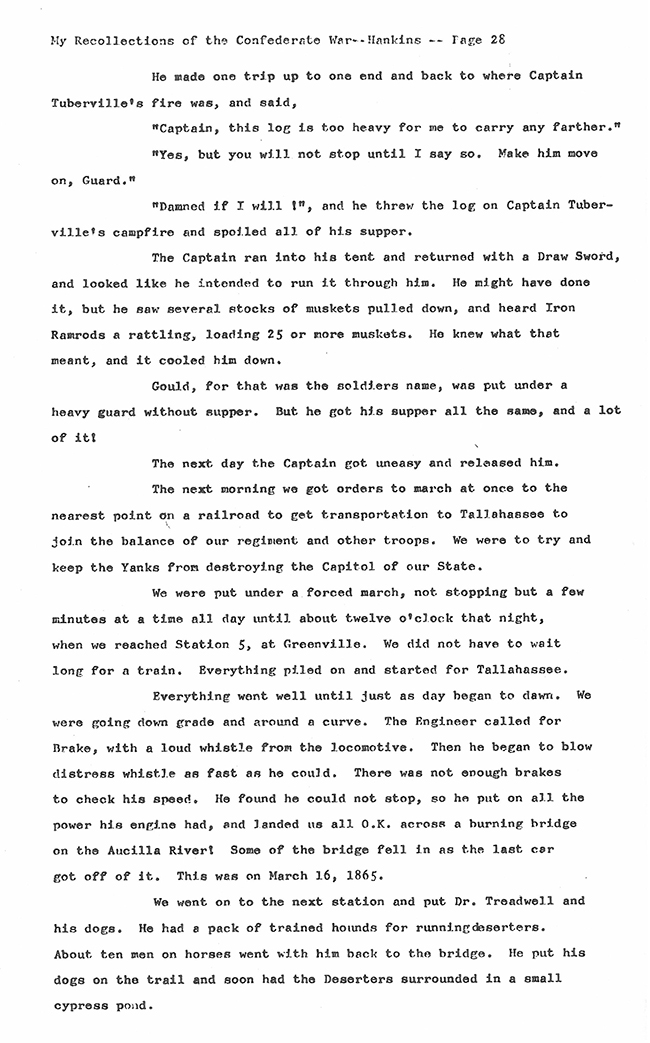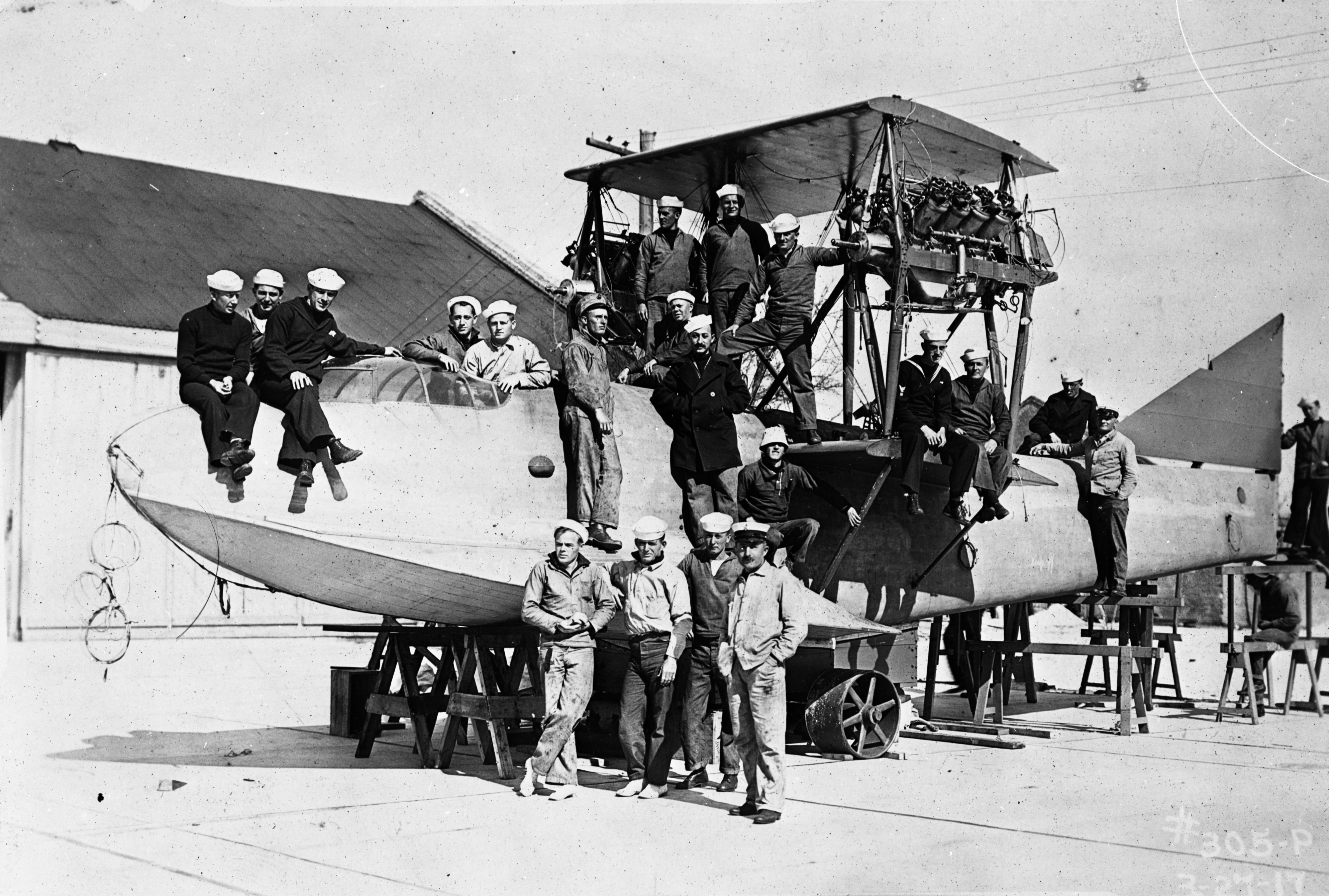Florida in the Civil War
Documents
Sylvanus M. Hankins
(From: Civil War recollections of S. M. Hankins, 1861-1865, Series S 1725)
The following is an excerpt from the recollections of Sylvanus M. Hankins about his experiences as an enlisted soldier during the American Civil War in Florida. Hankins' company was one of the units that fought at the Battle of Natural Bridge in March 1865. Hankins lived from 1847 to 1918. When he wrote these recollections is unknown.

S.M. Hankins Recollections - starting halfway down page 28:
The next morning we got orders to march at once to the nearest point on a railroad to get transportation to Tallahassee to join the balance of our regiment and other troops. We were to try and keep the Yanks from destroying the Capitol of our State.
We were put under a forced march, not stopping but a few minutes at a time all day until about twelve o'clock that night, when we reached Station 5, at Greenville. We did not have to wait long for a train. Everything piled on and started for Tallahassee.
Everything went well until just as day began to dawn. We were going down grade and around a curve. The Engineer called for Brake, with a loud whistle from the locomotive. Then he began to blow distress whistle as fast as he could. There was not enough brakes to check his speed. He found he could not stop, so he put on all the power his engine had, and landed us all O.K. across a burning bridge on the Aucilla River! Some of the bridge fell in as the last car got off it. This was on March 16, 1865.
We went on to the next station and put Dr. Treadwell and his dogs. He had a pack of trained hounds for running deserters. About ten men on horses went with him back to the bridge. He put his dogs on the trail and soon had the Deserters surrounded in a small cypress pond.
[page 29]
There were five of them in their Blue Uniforms. Three of them were killed, and two were captured and put in prison in Tallahassee.
We left Tallahassee for St. Marks on foot; quick time. We expected to meet Yanks any minute. However, we did not meet them until we got near St. Marks, at a place called Natural Bridge.
There must have been about two or three thousand of them, nearly all deserters and negroes. There was not over twelve or fifteen hundred of the Johnnie Rebs.
We met them and gave them such a hot reception that we soon had them rattled. We charged them with the Rebel Yell, and routed them completely. We captured a lot of negroes and a lot of deserters. We killed about 200 of them. We run them right under the mouth of their guns on their gun boats.
They shelled us, so we had to fall back for the night. The next morning the gun boats had all disappeared.
All of the deserters that was from Florida and any of them that the boys knew had deserted our army were given a drummed court marshall [sic].. They were condemned to be shot.
The next day at 10 o'clock, we put lightered [sic] stakes ten feet apart in the ground. We tied ten of them to the stakes and blindfolded them.
The guard marched up in steps of them.
"Halt!" "Ready!" "Aim!" "Fire!" and ten men that had deserted our army and country, put on a blue suit of Yankee Uniform, and took up arms against kindred and friends, were launched into Eternity.
[Misc. details about the shooting of William W. Strickland, etc.]
[page 31]
I forgot to mention that when we were in line of battle at Natural Bridge the Yanks had a picket line out that kept up a steady fire on us. Every now and then they would hit some of our boys. I saw one raise up and shoot and then drop down in some bushes. He had wounded two men in Captain Spencer's Company.
We all got behind trees, log, brush the best we could, waiting for orders to charge. Every time one of them showed up, he would be shot at. I saw the smoke of one fellow's gun and could see a little oak tree shaking when he would drop out of sight.
I had a good Springfield rifle. I got it in shape, took aim, to shoot at the little oak that he was doing his shooting from.
I said, "Boys, one of you put your cap on your gun and raise it up so he can see it, and when he shoots, I will see if I can't hit him."
He did as I said, but when Mr. Yank raised up to shoot, I shot first. I had good aim on him, and I silenced his battery.
We got orders to charge, but did not go where I shot the man. After the fight was over, I went there to see if I had hit my man. I had made a good shot. He was a Negro, sure enough dead. I got him right where his neck joined the body; broke his neck. He lay on his back with his gun cocked, and laying across his breast. I got a brand new Enfield rifle, 100 round of cartridges, a good canteen, oil cloth and eight dollars in green backs, which I kept until after the surrender and paid it out on my schooling. Did I do right or wrong? I think I was right, and I think so yet.

 Listen: The Folk Program
Listen: The Folk Program